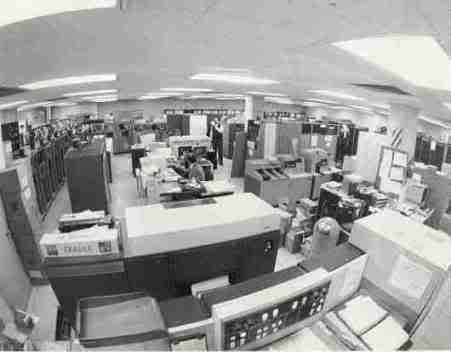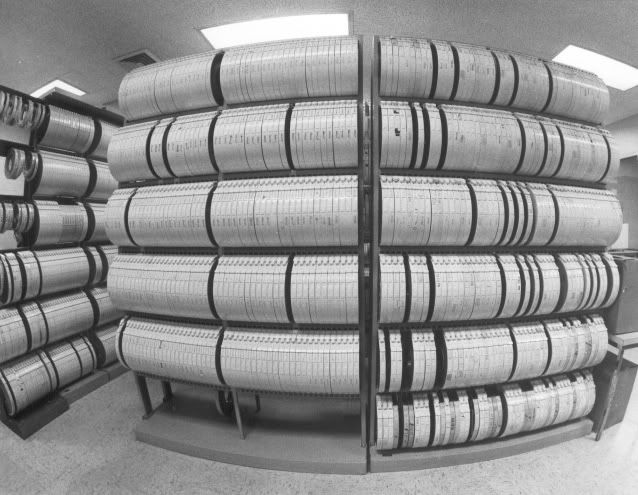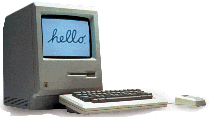This morning I was pondering the many ways I've made a living over the years, and I realized that I have acquired a bizarre collection of skills, not one of which is practicable or useful in this post-post-modern world. Because many of you reading this were but oocytes when my work life began, I thought I would share the list with you (kinda like, "Gee, Grandma, what DID you do before TV was invented?!" Please note that, in fact, television was invented and adapted into a large, viewable screen size before I was born. However, I did live through the Wizard of Ozian transition from black-and-white to color...and dang it, I still like black-and-white.)
Herewith, the list:
1982: Laundress. Yes, laundress. Every Saturday morning, I was paid $25 for five hours' toil in the basement of a Manhattan restaurant. I washed and dried four loads of tablecloths, napkins, and (no shit) the owner's shirts in silvery industrial machines...and after they were all dry, I had to iron each and every one of them by hand. Which is why, decades later, the palms of my hands are pretty insensate to heat. And why I can still iron a man's shirt like a pro. There's a job skill for the ol' resume.
1982: Supermarket cashier. Polyester three-quarter-sleeved jacket with store logo, a foot pedal to move the groceries forward on the black belt, and here's the real dilly: no scanners. I had to ring up every single itemon a keypad. Throughout that summer, I would wake up in the middle of the night to find my right hand ringing up independent of my conscious mind: 1.99 Grocery, 5.50 HBA, 9.98 Meat, 4.99 Txbl Item....
1983: Operations Assistant. I spent a summer working with my older brother and a hilarious crew of co-workers in a Wall Street computer room. We were responsible for data processing financial transactions for numerous high-end firms (geez, now that I think about it, that's scary). The room was a byzantine array of whirring, humming IBM hulks, exactly like this:

It was windowless and glaringly lit, and every day we went through the same exact paces, as dictated by the mainframe's programming. My mind was constantly racing from the monotony...but luckily my co-workers were inventive (they used to make a baseball bat out of rolled-up greenbar paper, and a ball out of a wad of tape, and voila--instant diversion!)

It was windowless and glaringly lit, and every day we went through the same exact paces, as dictated by the mainframe's programming. My mind was constantly racing from the monotony...but luckily my co-workers were inventive (they used to make a baseball bat out of rolled-up greenbar paper, and a ball out of a wad of tape, and voila--instant diversion!)
This job taught me how to operate a punch card reader, a 1960s contraption that endured for a surprisingly long time as a data storage and retrieval method:

I was also the tape librarian, collecting plastic, circular "scratch tapes" from big tape drives and refiling them in numerical order on massive storage racks:

The awesome thing about this job--besides the spontaneous baseball games--was getting paid more than I'd ever made in my life. I bought scads of records at Tower on 4th Street that summer, plus my brother and I had a crowd of friends who worked downtown, so Friday nights were a guaranteed blowout at the Raccoon Lodge and other Tribeca haunts.

I was also the tape librarian, collecting plastic, circular "scratch tapes" from big tape drives and refiling them in numerical order on massive storage racks:

The awesome thing about this job--besides the spontaneous baseball games--was getting paid more than I'd ever made in my life. I bought scads of records at Tower on 4th Street that summer, plus my brother and I had a crowd of friends who worked downtown, so Friday nights were a guaranteed blowout at the Raccoon Lodge and other Tribeca haunts.
1984: Database developer. Another obsolete computer system--the DEC-10--and another repetitive, summer-long task: catalog every single photo in Bowdoin College's Office of Public Information. I actually had a blast doing this; among the hundreds of photos were 19th century glass negatives, pics of every faculty member as a novice, and relics from the protest-laden 1960s. I still use the archivist skills...only, not on a computer with a tiny black screen and glowing, dot-matrixy orange letters.
1985: Film projectionist. Yup, I was the shadowy figure in the flickering little window-box, high above the theater seats, loading huge film reels onto creaky equipment and hoping my manual transitions from one reel to the next would be seamless. I also ran filmstrips--BOOP!--in classrooms. Doing this job made me feel invisible.
1985: Disc jockey. Two turntables, a microphone, and moi, broadcasting jazz over the airwaves. Bowdoin College had a massive vinyl LP collection, and I never tired of fingering the spines in the shelves and finding new/old music to play. Three years later, the station went digital, and hundreds of LPs were ignominiously disposed of, upended into trashcans. Oh! my heart! I salvaged some, but the station managers chucked them faster than I could rescue them. Heathens.
1985: Telephone operator. Ever see those Movietone films of ladies with a clunky headset, seated at a big console full of plugs and holes? That was me, every weekday lunch hour, when I would cover for the college operator. I developed an operator patois: "MmmmmBowdoinnnnCollege," I would say as I picked up the incoming calls. They'd ask for an extension; I would pull up a thick plug, find the corresponding hole with the extension number, and ram the plug home to connect the callers to their party. And even better--once I plugged in, I had to manually ring the extension with a toggle switch. Once the call ended, the line would emit this irritating errrrrnnnnn noise to remind me to pull out the plug. If I fell behind, the console became a befuddling, crisscrossed maze of flexible wires. It was all very I Love Lucy.
1985-86: Secretary. Smith-Corona typewriters, keys jumpy with electrified juice. Liquid paper and Correctype--lots of it. Index cards. And phones with flashing hold buttons shaped perfectly square.
1986-94: Editorial Assistant. Yet another useless computer skill: laying out a tabloid-size newsletter on a minature Macintosh screen. You learn how to scroll, squint, and cross your fingers when you hit "print".

This job also trained me in manual layout of newspaper advertisements, which required use of a waxer: a handheld metal roller with an electric plug. Inside the roller is a block of wax that's heated to sticky goo (which means it's hot as a mofo. See above for iron-acquired hand insensitivity). To do newspaper layouts, you'd scissor little paper images into the desired shape, run the roller over the back of the paper-bit, then press it into place on the master page.

This job also trained me in manual layout of newspaper advertisements, which required use of a waxer: a handheld metal roller with an electric plug. Inside the roller is a block of wax that's heated to sticky goo (which means it's hot as a mofo. See above for iron-acquired hand insensitivity). To do newspaper layouts, you'd scissor little paper images into the desired shape, run the roller over the back of the paper-bit, then press it into place on the master page.
I am a master of lost arts, of machinery that clunks and whirs, plastics that are hard and inflexible, metals that gleam with the patina of use and the sheen of oil. My fingers have been smudged with typewriter ribbon, reddened by unsafe levels of heat, and numbed with keypad entry. My first dalliance with minimum wage saw me getting $3.25 an hour.
The world turns.